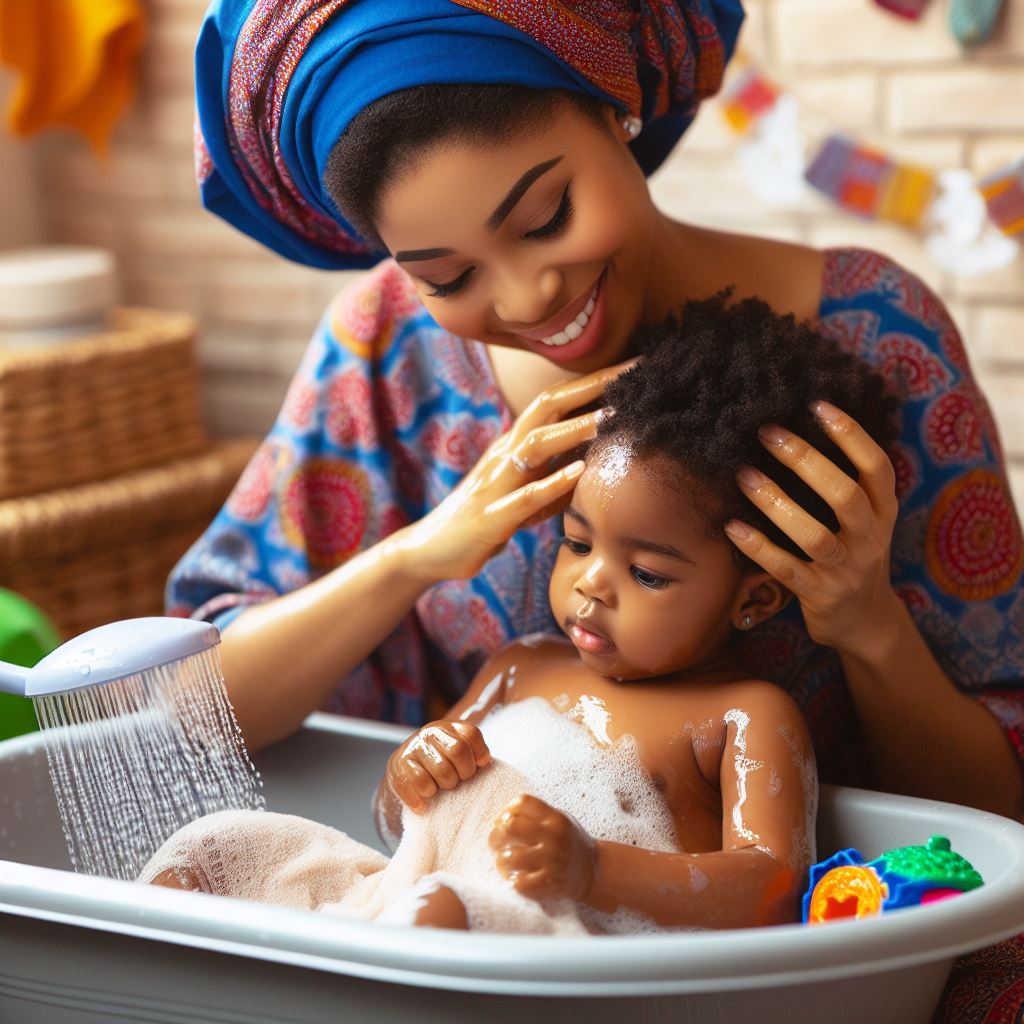Introduction
Feeding gear essentials play a crucial role in the overall well-being and development of Nigerian babies.
Choosing the right feeding equipment is of utmost importance as it directly affects their health and comfort.
Providing the appropriate gear ensures they receive the necessary nutrients for growth and enjoy a pleasant feeding experience.
Feeding gear essentials are vital tools that aid in the proper nourishment of Nigerian babies.
From bibs and spoons to bottles and formula dispensers, these items make feeding time easier for parents and caregivers while meeting the nutritional needs of infants.
By selecting the right feeding equipment, Nigerian babies can consume their meals comfortably, avoiding any discomfort or difficulties that may arise from using poorly designed gear.
The proper tools help prevent issues like choking, spills, or unhygienic feeding environments, promoting a safe and healthy feeding experience.
In addition to ensuring safety and comfort, choosing the right feeding gear contributes to the overall well-being of Nigerian babies.
Properly designed equipment promotes proper digestion, reduces colic and acid reflux, and supports the immune system, leading to a healthier and happier child.
Moreover, the right feeding gear enhances the bond between parents and their babies during feeding time.
When infants are comfortable and stress-free, it allows for more positive interactions and enjoyable moments between caregivers and their little ones.
In fact, feeding gear essentials are of paramount importance for Nigerian babies.
By selecting the right tools, parents can provide their infants with a safe, comfortable, and nutritionally rich feeding experience, ultimately contributing to their overall well-being and development.
Baby Bottles
When it comes to feeding your Nigerian baby, there are a few essentials that you need to have.
One of the most important items is a baby bottle. Baby bottles come in different types and it’s essential to choose the right one for your baby.
Parenting Made Just for You
Get personalized Parenting Solutions tailored to your child’s needs. Transform your parenting journey with expert guidance in 1-3 days.
Get StartedTypes of Baby Bottles
There are various types of baby bottles available in the market. Some of the popular types include:
- Glass bottles: These are durable and easy to clean, but they can be heavier than other types.
- Plastic bottles: These are lightweight and usually have measurement markings, but they may not be as durable as glass.
- Silicone bottles: These are flexible and unbreakable, making them a good option for on-the-go feeding.
The Importance of BPA-Free Bottles
It is essential to choose BPA-free bottles for your baby’s safety.
BPA, or bisphenol A, is a chemical that can be found in some plastic materials.
Studies have suggested that BPA can have potential health risks, especially for infants.
By choosing BPA-free bottles, you can ensure that your baby is not exposed to this harmful chemical.
Look for bottles that are labeled as BPA-free or made from materials such as glass or silicone, which are naturally BPA-free.
Selecting the Right Size and Shape
When selecting a baby bottle, it’s important to consider the size and shape that will be most comfortable for your baby. Here are some tips:
- Start with a small bottle: For newborns, a small bottle with a capacity of 4 to 5 ounces is usually sufficient.
- Consider your baby’s age: As your baby grows, you may need to transition to larger bottles with higher capacities.
- Choose a bottle with a wide neck: Wide-neck bottles are generally easier to clean and fill.
- Consider the shape of the nipple: Some babies may prefer nipples that closely resemble the shape of a mother’s breast.
Anti-Colic Features
Colic refers to excessive, often fluctuating crying in an otherwise healthy baby.
It can be caused by various factors, including gas and swallowing air during feeding.
To prevent discomfort and reduce the risk of colic, look for bottles with anti-colic features, such as:
- Vent systems: These help reduce air intake, minimizing the chances of gas and colic.
- Air-free technology: Some bottles are designed to eliminate air bubbles, making feeding more comfortable for your baby.
- Angled bottles: These bottles are designed to keep the nipple full of milk, reducing the intake of air during feeding.
Feeding your Nigerian baby is a crucial part of their growth and development.
By choosing the right baby bottles with these essential features, you can ensure a comfortable and safe feeding experience for your little one.
Read: Nigerian Parents’ Guide to Baby Monitors
Nipple and Bottle Sterilizers
Sterilizing bottles and nipples is crucial for maintaining proper hygiene and ensuring your baby’s health.
Unveil the Perfect Name that Tells Your Family's Story
Let us help you find a name that embodies your family's values, traditions, and dreams. Our personalized consultation weaves cultural insights to create a name that's uniquely yours.
Get StartedHere are some essential tips and options for sterilizers:
Importance of Sterilization
Properly sterilizing bottles and nipples helps eliminate harmful bacteria and ensures your baby’s safety.
Without thorough sterilization, bacteria can grow and cause infections, leading to various health issues.
1. Various Sterilizer Options
When it comes to sterilizers, you have several options to choose from:
- Electric Sterilizers: These are convenient and easy to use, ensuring efficient sterilization with the help of steam.
- Microwave Sterilizers: These sterilizers use steam generated in the microwave to kill bacteria.
- Cold-Water Sterilizers: This option involves using sterilizing tablets or liquid to kill bacteria.
2. Proper Sterilization Techniques
Follow these tips to ensure proper sterilization:
- Clean bottles and nipples thoroughly with warm soapy water before sterilizing.
- Rinse them well to remove all traces of soap.
- Ensure all parts of the sterilizer are clean and in good condition.
- Place bottles and nipples in their respective compartments of the sterilizer.
- Add water as per the sterilizer’s instructions.
- Follow the sterilizer’s guidelines for setting the appropriate temperature and time.
- Once the sterilization process is complete, allow the bottles and nipples to cool before use.
3. Recommended Frequency
The frequency of sterilization depends on your baby’s age:
- Newborns: It is recommended to sterilize bottles and nipples before each use.
- First year: Sterilizing once a day is usually sufficient, especially if bottles are used frequently.
- After the first year: Sterilizing occasionally or periodically is acceptable, as long as proper cleaning practices are followed.
Remember that maintaining cleanliness and hygiene throughout the feeding process is crucial.
Regularly check bottles and nipples for any signs of wear and tear, and replace them as needed.
By prioritizing proper sterilization techniques and using the most suitable sterilizer for your needs, you can provide a safe and hygienic feeding environment for your Nigerian baby.
Read: The Ultimate Baby Playpen Guide in Nigeria

Breast Pumps
Welcoming a newborn into the world is a joyous occasion, but it also brings forth new responsibilities, especially for nursing moms.
In this section, we delve into the essential tool that aids breastfeeding mothers in their journey – the breast pump.
Benefits of Using Breast Pumps
Breast pumps are indispensable for nursing moms, offering a myriad of benefits that make the motherhood journey more convenient and flexible.
Firstly, they enable moms to express and store breast milk, allowing them to share feeding responsibilities with partners or caregivers.
This flexibility is particularly crucial in a society like Nigeria, where extended family plays a significant role in childcare.
The Types of Breast Pumps
There are various types of breast pumps available, catering to different needs and preferences.
Manual pumps offer simplicity and portability, making them ideal for on-the-go moms.
Electric pumps, on the other hand, provide efficiency and ease of use, perfect for those who prioritize time-saving solutions.
Wearable pumps add a modern twist, allowing moms to discreetly express milk hands-free, providing the freedom to multitask.
Choosing the Right Breast Pump
Selecting the right breast pump is a personal decision, influenced by lifestyle, preferences, and individual needs.
For the busy mom who values efficiency, an electric pump might be the best choice, while a manual pump suits those who prefer a more hands-on approach.
Considering factors like suction strength, noise level, and ease of cleaning can further refine the decision-making process.
Maintaining Cleanliness and Hygiene
Ensuring the cleanliness and hygiene of breast pumps is paramount to safeguard both the baby’s health and the mother’s well-being.
Regularly cleaning and sterilizing pump parts, storage containers, and accessories is crucial to prevent contamination.
Mothers in Nigeria should be aware of the available sterilization methods and follow recommended guidelines to maintain a healthy breastfeeding routine.
In short, breast pumps empower Nigerian moms by providing flexibility, convenience, and a sense of control in their breastfeeding journey.
Understanding the benefits, exploring the types, and making informed choices will help mothers embrace this essential tool, fostering a healthier and more harmonious motherhood experience.
Read: Baby’s Emotional Development: A Nigerian Perspective
Feeding Spoons and Plates
As we continue our exploration into creating the perfect haven for your little one within the baby playpen, we delve into the essential realm of feeding.
Feeding time is not only a crucial aspect of your baby’s development but also a delightful journey filled with adorable messes and memorable moments.
In this section, we’ll guide you through the importance of choosing the right feeding spoons and plates for your bundle of joy.
Feeding Spoons: A Touch of Comfort and Safety
When it comes to feeding spoons, the first consideration is safety.
Opt for spoons made from BPA-free, non-toxic materials to ensure your baby’s health is always a top priority.
These materials guarantee that no harmful chemicals leach into your little one’s food, promoting a worry-free feeding experience.
As your baby progresses through different stages of development, consider the variety of spoon sizes and shapes available.
Soft-tipped spoons are gentle on delicate gums, while longer handles provide easy gripping for tiny hands learning to feed themselves.
Investing in a set with different options ensures you’re prepared for every milestone in your baby’s exciting journey towards independent feeding.
Plates: A Canvas for Culinary Adventures
Choosing the right plates is equally important, as they set the stage for delightful mealtimes.
Look for plates that are not only visually appealing but also practical for busy parents.
Opt for materials that are easy to clean, saving you time for those precious moments with your little one.
Microwave-safe plates offer convenience when reheating meals, making it easier to maintain a consistent feeding schedule.
Keep in mind that easy-to-clean plates are a lifesaver during those inevitable messy meals, allowing you to focus on creating a positive and enjoyable environment for your baby.
In essence, selecting the right feeding spoons and plates is a thoughtful investment in your baby’s well-being.
Prioritize safety, consider the developmental needs of your little one, and opt for convenience to make feeding time a joyous experience for both you and your baby within the confines of the ultimate baby playpen.
Read: Compact & Travel-Friendly Baby Gear in NG
High Chairs and Booster Seats
As your little one embarks on the exciting journey of discovering solid foods, creating a safe and enjoyable feeding environment is paramount.
High chairs and booster seats become indispensable allies in this adventure, offering a range of benefits that go beyond mere convenience.
Benefits of High Chairs and Booster Seats
High chairs and booster seats are more than just elevated platforms for your baby during mealtime.
They play a crucial role in fostering independence, promoting proper posture, and ensuring a mess-free feeding experience.
By placing your baby at the right height, these seats encourage eye contact and social interaction during family meals, nurturing important social skills from an early age.
Types of High Chairs and Booster Seats
The market is brimming with options, each catering to different needs and preferences.
Traditional high chairs with a tray are excellent for containment and easy cleaning, while convertible models grow with your child, transforming into a toddler chair.
Booster seats, on the other hand, are perfect for on-the-go parents, offering portability without compromising safety.
Safety First: Harnesses and Adjustable Heights
When choosing a high chair or booster seat, prioritize safety features.
Look for models with secure harness systems to keep your little one snugly in place, preventing any accidental slips.
Adjustable height settings are a plus, accommodating your growing child and allowing them to comfortably reach the table.
Stability is key, so opt for chairs with a broad base for enhanced support.
Easy to Clean and Sturdy
Babies are notorious for creating delightful messes during mealtime.
Opt for high chairs with removable, washable trays and stain-resistant materials for effortless cleanup.
Sturdiness is equally important to withstand the inevitable wiggles and squirms. Ensure the chair’s construction is durable and built to withstand the rigors of daily use.
In review, investing in a high-quality high chair or booster seat is a game-changer for mealtime bliss.
Consider the specific needs of your family, prioritize safety, and choose a chair that not only stands the test of time but also makes each feeding session a joyous, mess-free affair.
Delve into the Subject: Preemie Playtime: Safe and Beneficial Toys
Conclusion
Proper feeding gear essentials play a vital role in the healthy development of Nigerian babies.
Investing in these items ensures that they receive the nutrition they need and helps prevent feeding-related issues.
Parents need to prioritize safety and comfort when choosing feeding gear for their babies.
Thorough research should be conducted before making any purchases to ensure they meet safety standards and are appropriate for their child’s age and developmental stage.
In the end, by investing in proper feeding gear essentials, parents can provide their Nigerian babies with a comfortable and safe feeding experience.
The right gear not only promotes healthy eating habits but also contributes to the overall well-being and happiness of the child.
As a final tip, parents should consider opting for versatile and durable feeding gear that can grow with their baby, saving them money in the long run.
Additionally, seeking recommendations from other parents and consulting healthcare professionals can provide valuable insights into selecting the best feeding gear essentials for Nigerian babies.




